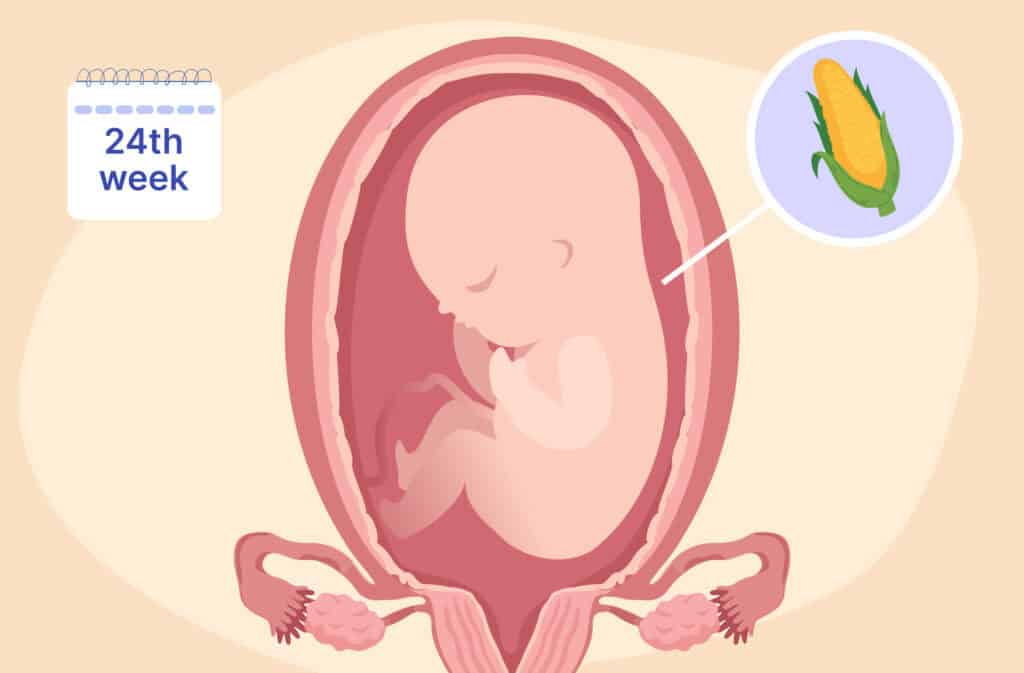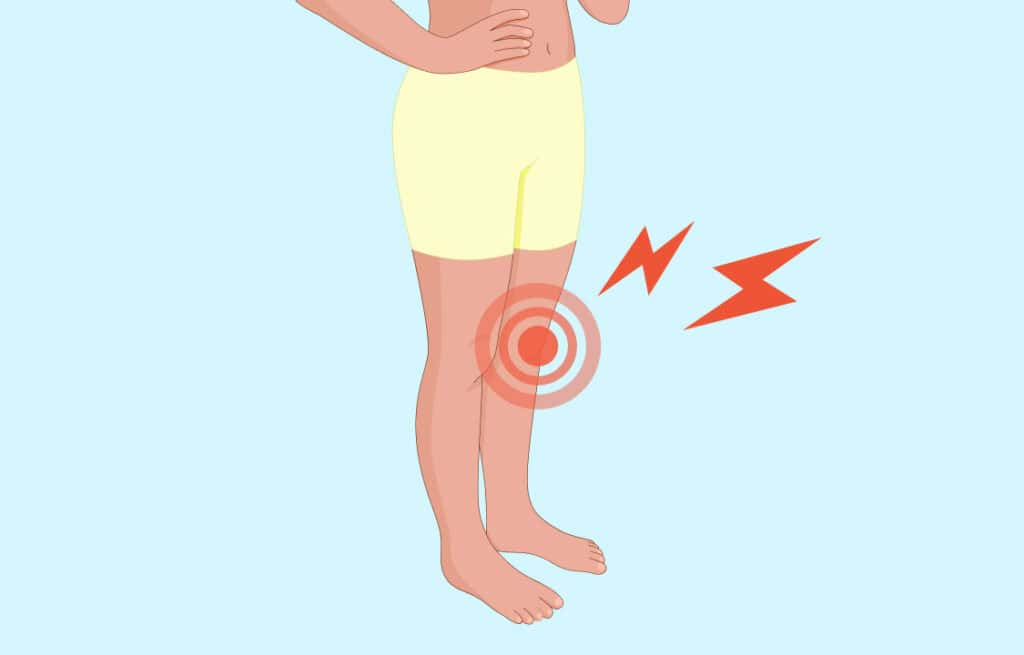Femia > Health Library > Pregnancy > Pregnancy week by week > 24 Weeks pregnant: From tiny kicks to big developments
24 Weeks pregnant: From tiny kicks to big developments

- Updated Feb 20, 2025
- Published
CRAFTED BY HUMAN
Crafted by human At Femia, we provide accurate and up-to-date information at every stage of your journey, from trying to conceive, pregnancy and postnatal support. All content is created by a real person based on in-depth research and own professional experience. Femia ensures that you will receive expert advice, strict accuracy and a personalized approach from our authors/medical experts. Learn more about our editorial policy.
FACT CHECKED
Fact checked At Femia Health, we maintain the highest standards of editorial excellence in delivering content focused on helping you conceive, guiding you through pregnancy, and supporting you postpartum. Explore our content review principles to learn how we ensure the accuracy and quality of our health and lifestyle tips for every stage of your journey.
At 24 weeks pregnant, your baby about the size of an ear of corn is practicing vital movements like breathing and stretching and becoming more refined, and their movements more noticeable. You may notice a larger bump, stronger baby kicks, and symptoms like swelling or Braxton Hicks contractions.
Congratulations on reaching 24 weeks pregnant! This week marks an important milestone in your pregnancy, as your baby continues to grow rapidly and develop essential features for life outside the womb. You might experience new symptoms or changes in your body, so understanding what’s happening during week 24 can help you navigate this stage with confidence.
Get personalized insights every step of the way with the Femia mobile app
Pregnancy symptoms at 24 weeks
Here are common symptoms to expect during week 24 of pregnancy:
Rashes
If you notice new skin symptoms like itchiness, raised bumps, or hives, consult your doctor or midwife. Most rashes during pregnancy are due to allergies or contact dermatitis, but conditions like an atopic eruption of pregnancy (AEP), PUPPP, or pemphigoid gestationis can cause intense itching and rashes.
Spotting
Light bleeding or spotting during the second trimester can occur due to changes in your cervix or cervical polyps. While usually harmless, if you experience heavier or regular bleeding, seek immediate medical advice.
Mood swings
While mood swings may ease by 24 weeks, they are still common during the second trimester. Hormonal shifts, stress, fatigue, and discomfort can all contribute. If they become frequent or intense, or last longer than two weeks, consult your provider to rule out pregnancy anxiety or depression.
Shortness of breath
Breathlessness is common as your body demands more oxygen, but if it’s severe or accompanied by chest pain, a persistent cough, or difficulty breathing, seek medical care immediately. Mild shortness of breath is normal due to hormonal changes and increased blood volume.
Increased appetite
A stronger appetite during the second trimester is common, as you need additional calories to support your growing baby. Opt for healthy, fiber-rich snacks and balanced meals to manage hunger and prevent excessive weight gain.
Melasma
Pregnancy hormones may increase melanin production, causing dark patches (melasma) on your face or forearms. Using sunscreen with SPF 30 or higher can help minimize this, and the condition typically fades after birth.
Vision changes
Hormonal changes during pregnancy can cause temporary vision changes such as blurred vision or increased nearsightedness. These changes are typically harmless but can sometimes indicate issues like preeclampsia, so if you experience significant vision changes, double vision, or flashes of light, it’s important to consult your doctor.
👉Find out more: What to expect at 23 weeks pregnant: Baby size & movements
Your body at 24 weeks pregnant
Your body is continuing to adapt to your growing baby, and your uterus is now about the size of a soccer ball. You may feel more strain on your back and abdomen as your center of gravity shifts, so maintaining good posture is crucial.
Weight gain is expected at this stage, with total recommendations depending on your pre-pregnancy weight:
- Normal weight: 25–35 lbs
- Underweight: 28–40 lbs
- Overweight: 15–25 lbs
- Obese: 11–20 lbs
During the second and third trimesters, underweight and normal-weight women should aim to gain about 1 lb/week, while overweight and obese women should aim for about 0.5 lbs/week. Tracking your progress with a pregnancy weight gain calculator can help ensure you’re within the recommended range.
24-week pregnant belly
Your belly at 24 weeks is likely larger and more defined, with your baby now taking up more space. It’s common to feel increased pressure on your lower abdomen, especially when standing for long periods. Maternity clothes can help you stay comfortable and support your growing bump.
Baby development at 24 weeks of pregnancy
At 24 weeks, your baby’s development continues to accelerate as they prepare for life outside the womb.
- Your baby’s lungs. At this stage, your baby’s lungs are developing but are not yet fully mature. They’re producing surfactant, a substance that will help their lungs expand after birth. Although your baby would require medical help if born now, their lungs are getting closer to being ready to breathe on their own.
- Gaining weight. Your baby is steadily gaining weight, which is crucial for their survival after birth. At 24 weeks, they weigh about 1.3 pounds (around 600 grams) and are about the size of an ear of corn. They’re getting more fat under their skin, which will help regulate their body temperature when they’re born.
- Raising an eyebrow. By 24 weeks, your baby is showing signs of increased facial expression control. They may be able to raise an eyebrow, making them look even more like a tiny, fully-formed baby. Their muscles and nervous system are maturing, allowing them to respond to external stimuli such as sounds or light.
At this point, your baby is continuing to grow and refine their skills, preparing for the outside world.
24-week baby size
The 24-week-old baby size is approximately 12 inches long and weighs about 1.5 pounds, similar to the size of an ear of corn. This growth is essential for building strength and coordination.
24-week ultrasound
A 24-week ultrasound may show detailed images of your baby’s facial features, limbs, and even movements like thumb-sucking or stretching. If you’ve had your anatomy scan already, this ultrasound might be a follow-up to check on your baby’s growth and the health of your placenta.
Get personalized insights every step of the way with the Femia mobile app
Tests to expect at 24 weeks pregnant
At 24 weeks pregnant, several tests may be conducted to monitor your health and your baby’s development:
- Glucose screening: Typically performed between 24 and 28 weeks of pregnancy, this test checks for gestational diabetes. You’ll drink a sugary liquid, and your blood will be drawn afterward to assess how your body processes sugar.
- Blood pressure monitoring: Regular checks to detect any signs of high blood pressure or preeclampsia.
- Fetal heartbeat and movement: Your provider may listen to your baby’s heartbeat and ask about fetal movements to ensure your baby is developing well.
- Urine test: Checks for protein or glucose that could signal potential issues like preeclampsia or gestational diabetes.
- Ultrasound: If not already done, an ultrasound may be performed to check the baby’s growth, position, and amniotic fluid levels.
- Blood tests: To check for anemia, infections, or other health conditions.
These tests are important for ensuring both your health and your baby’s well-being as you move through your second trimester.
👉Find out more:
25 Weeks pregnant: How your baby’s growing and what you should know
Navigating week 26: Baby’s Growth, symptoms, and expert tips
Health tips and self-care at 24 weeks pregnant
Managing back pain
As your baby grows and your uterus expands, you may begin experiencing back pain, especially in your lower back. This is due to the added weight and your changing center of gravity. To manage this, practice good posture, use pillows for support when sitting or sleeping, and avoid standing for long periods. Gentle stretching or yoga can also help relieve tension. If pain is persistent, consult with your healthcare provider for further treatment options, such as physical therapy or safe pain relievers.
Stay hydrated
Proper hydration is crucial during pregnancy, especially as your blood volume increases and you may experience swelling. Aim to drink at least 8–10 cups of water daily. Staying hydrated can help prevent dehydration, constipation, and excessive swelling, while also supporting your baby’s development. Carry a water bottle with you and sip throughout the day to maintain hydration.
Monitor your weight gain
At 24 weeks, your baby is growing rapidly, and you will likely see an increase in your weight. It’s normal to gain around 1 pound per week during the second trimester. However, it’s important to focus on healthy eating. Opt for nutrient-dense foods, including fruits, vegetables, whole grains, lean proteins, and healthy fats. Avoid excessive amounts of unhealthy foods, such as those high in sugar and fat. Discuss your weight gain goals with your doctor to ensure you’re on track.
Exercise regularly
Regular exercise can help relieve discomfort, prevent excessive weight gain, and prepare your body for labor. Aim for at least 30 minutes of moderate physical activity most days of the week. Walking, swimming, and prenatal yoga are great options that help relieve stress and support muscle strength. Always check with your doctor before starting any new exercise routine to ensure it’s safe for your pregnancy.
Avoid stress
Managing stress is essential for both you and your baby. Pregnancy can be emotionally taxing, but reducing stress will benefit your health. Practice relaxation techniques such as deep breathing, meditation, or listening to calming music. Consider prenatal massage to relieve tension and promote relaxation, or engage in activities you enjoy to keep your mind at ease.
Wear comfortable clothing
As your body changes, wearing the right clothes can help you feel more comfortable. Maternity wear with stretchy fabrics and proper support, such as a maternity bra and shoes with good arch support, can make a big difference. Avoid tight clothing that restricts circulation, and make sure to wear loose, breathable fabrics to stay comfortable throughout the day.
Prepare for the third trimester
At 24 weeks, you’re entering the second half of your pregnancy, so now is the time to start preparing for the final trimester. Consider creating a birth plan, researching birthing classes, and setting up your baby’s nursery. It’s also a good time to discuss with your healthcare provider what to expect in the coming weeks, including signs of labor and what to do if it starts early.
Manage heartburn and indigestion
Heartburn and indigestion are common at this stage due to hormonal changes and the growing uterus putting pressure on your stomach. To manage symptoms, avoid large meals, eat smaller meals throughout the day, and avoid foods that trigger heartburn such as spicy, fatty, or acidic foods. Sleeping with your head elevated and using pregnancy-safe antacids can also help alleviate discomfort. Always consult your doctor before taking any medication.
What are 5 warning signs of a possible problem during pregnancy?
- Severe abdominal pain or cramping – This could be a sign of complications such as ectopic pregnancy, miscarriage, or preterm labor.
- Heavy bleeding or spotting – Bright red bleeding, especially with pain, could indicate a miscarriage or placental problems.
- Severe headaches or vision changes – These symptoms could be signs of preeclampsia, a serious pregnancy complication.
- Sudden or severe swelling – Especially in the face or hands, this may indicate preeclampsia or a blood clot.
- Decreased baby movements – If your baby’s movement patterns decrease significantly, it’s essential to consult your healthcare provider immediately.
Questions from the Femia community
How to recognize preterm labor?
Signs of preterm labor include regular contractions, lower back pain, pelvic pressure, or fluid leakage before 37 weeks. If you notice any of these symptoms, contact your healthcare provider immediately for evaluation.
Can I still exercise at 24 weeks?
Yes, you can still exercise at 24 weeks, as long as your healthcare provider gives approval. It's important to focus on low to moderate-impact activities, such as strength/resistance training, walking, swimming, or prenatal yoga. Avoid exercises that carry a risk of falling, such as running on uneven surfaces, or any activities that could put pressure on your abdomen. Always listen to your body and stop if you experience pain, dizziness, or discomfort.
Where is the baby positioned at 24 weeks pregnant?
At 24 weeks, your baby is still small enough to move around freely within the womb, but they are typically positioned head-down or in a breech position. However, they still have plenty of room to shift and may move into a different position in the coming weeks as you approach the third trimester.
What should you feel at 24 weeks pregnant?
At 24 weeks pregnant, you may feel more noticeable kicks and movements from your baby. You might also experience increased back pain, pelvic pressure, and occasional Braxton Hicks contractions. Some women report feeling more energetic compared to the first trimester, but it’s also normal to feel fatigued as your body works harder to support your growing baby.
The bottom line
At 24 weeks pregnant, your baby is growing rapidly and practicing movements essential for life outside the womb. Your body is adapting with a larger bump, stronger kicks, and potential symptoms like swelling or Braxton Hicks contractions. Prioritize self-care, monitor your baby’s activity, and stay proactive about your health as you navigate this exciting stage.
References
- “24 Weeks Pregnant: Symptoms, Baby Development & Tips.” BabyCenter, www.babycenter.com/pregnancy/week-by-week/24-weeks-pregnant.
- “Week 24 of Pregnancy: Symptoms, Baby Development & More.” What to Expect, www.whattoexpect.com/pregnancy/week-by-week/week-24.aspx.
- “24 Weeks Pregnant: Baby Development, Symptoms & Tips.” NHS, www.nhs.uk/pregnancy/week-by-week/1-to-12/24-weeks/.
- “Pregnancy Week 24: What to Expect.” American Pregnancy Association, www.americanpregnancy.org/healthy-pregnancy/week-by-week/24-weeks-pregnant/.

Explore an in-depth guide of the symptoms, causes, treatment, prevention, supplements, and natural remedies for menopause joint pain.

Click to understand the symptoms and possible causes of a hypertonic pelvic floor. Find your treatment strategy to relieve hypertonicity and improve your pelvic health.

Learn how long to wait before trying to conceive after stopping different types of birth control, and understand how your body adjusts to increase your chances of pregnancy.

